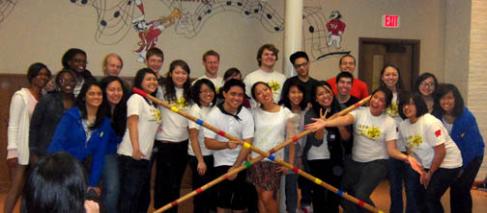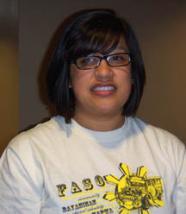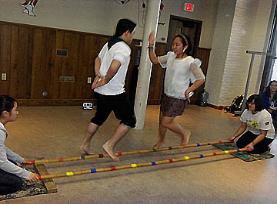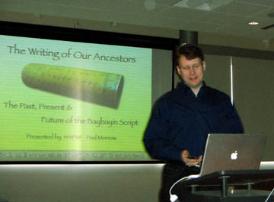

Noelle Reyes on UW-Filipino American Student Association (FASO)
Standing up to be recognized
Standing up to be recognized






By Heidi M. Pascual
Several things that usually characterize young Filipino-American
students are: that they’re very studious, sometimes shy and reserved,
and focused mainly on how to become productive citizens of America.
They are well-guarded and supervised by their parents, and some
families include grandparents who are providers of age-old cultural
information not readily available in local classrooms, although the latter
arrangement seems to have faded away when nursing homes and
senior residences became more popular.
Times are changing rapidly, and with the turn of the clock, a new breed of
Filipino youth born or raised in America grew up not knowing their
parents’ culture, especially their native language and norms. However,
from this generation, leaders emerge who seek to promote cultural
awareness not only among themselves but also among others with like
interest, and in the process direct the spotlight to the groups they lead,
however miniscule they may be, for some sort of recognition or respect.
Noelle Reyes is one of those leaders at UW-Madison. A third-year
Psychology student, Reyes is co-president of the Filipino-American
Student Association (FASO). This young lady projected an aura of
confidence that spells no less than success in what FASO seeks to
accomplish.
In an interview with Asian Wisconzine, Reyes talked about FASO’s
activities and why they’re doing them. The most recent project FASO
embarked on was a two-day event called “Rated P.”
“Rated P this is the second time that we did it, an idea of last year’s
president and we want to continue it for her.,” Reyes said. “We wanted to
have more workshops, and get the name of FASO out there. I think the
Filipino American/Filipino community in this campus isn’t very familiar
with each other at UW. We just want to expose the organization and
make people more aware of who we are.”
Workshops are at the heart of this goal, for FASO believes its members
will learn from them as well. “We’ve done Arnis workshops, martial arts,
history workshops, and at the current Rated P, we had a writing
workshop and a spoken word workshop, “ Reyes beamed as she said
this. “So we’re trying to incorporate everything that we all want to learn,
too.
“Rated P” was born out of FASO’s desire to have a big festival, similar to
what other student organizations at UW – that are bigger in number--
have started over the years. “We’re thinking, how would people know
about the organization, because other organizations have big parties, big
University of Wisconsin-Madison FASO members pose for Asian Wisconzine after a
dance performance and tutorials
dance performance and tutorials
| FASO Co-President Noelle Reyes |
Tinikling is the Philippines' National Dance.
Filipino script expert Paul Morrow conducts a
writing workshop on Baybayin
writing workshop on Baybayin
festivals, so we thought, let’s try it,” Reyes recalled as the FASO board brainstormed on the title. “In my mind, Rated P is like
a movie: what are you going to expect? So we just had to figure out what ‘P’ meant. For this year, we came up with
“Powerful,” “Provocative,” “Pinoy/Pinay” – but it could be anything.”
Indeed, for two days, April 1-2, FASO presented powerful and provocative workshops and performances. The first day
featured “Expression of Words: Spoken Word” with California artist Ruby Ibarra* at the Student Activity Center, Hearing
Room and later that night, Ruby Ibarra& Manny Garcia** with special student performers held a concert at the Memorial
Union’s Rathskeller.
*Ruby Ibarra is a rapper, spoken word artist, and music producer from the Bay Area, CA. Her style is often described to be
a 90s hiphop sound with a modern twist. With influences by A Tribe Called Quest, Lauryn Hill, and Wu Tang Clan. Find her
on http://www.youtube.com/rubyibarra
**Manny Garcia is a singer-songwriter from Chicago, IL. Writing original music and posting covers to YouTube, Manny has
been featured in such publications as The Chicago Sun Times, Entertainment Weekly, and TV Guide. He is currently writing
and recording his second EP (first with a full band), slated for release in mid-April. Find him on www.iammanny.com
The next day, April 2, Rated P featured “Writing of Our Ancestors: Past, Present & Future of the Baybayin Script” which was
facilitated by Filipino script expert Paul Morrow at the Student Activity Center, Hearing Room. Paul Morrow is the associate
editor and co-publisher of the Pilipino Express News Magazine in Winnipeg, Canada. His regular column, In Other Words,
is devoted to Filipino history, language and culture. In the early 1990s he created several baybayin fonts, one of which
baybayin enthusiasts have dubbed the “Times New Roman of baybayin fonts.” It is now incorporated into the current
designs of all Philippine paper currency.
To cap the day, FASO presented at the Red Gym the Tinikling dance, the national dance of the Philippines that uses two
bamboo poles with dancers jumping in and out of them to the tune of a fast melodious music, exhibiting skills that help the
dancers avoid their legs being sandwiched by the bamboos. Many in the audience tried to learn the Tinikling after the
performance. Attendees also enjoyed a taste of ethnic Filipino food like pancit, cassava cake and spring rolls.
Getting more ambitious this year, FASO plans to do more workshops that focus on culture. “We want to do food
workshops-- teaching people how to cook, which would be new,” Reyes said proudly. “And a dance workshop. This is the
first year that we learned dances, so I want to incorporate that. So we’re still building on different kinds of workshops, such
as history workshops. The professors/faculty are always willing to do workshops; but we base it on stuff that we want to
learn; that we think is interesting. In like manner, on the 22nd, one of our members is doing her senior thesis on the EDSA
Revolution, and she’s going to hold a workshop about that. I find that interesting because I don’t know too much about it.”
Reyes admits that in sharing her parents’ culture and hers, everyone learns a little bit about herself and her history. “I’m a
first generation Filipino American in our family,” she says, “so I ask my parents some things, like history, because I want to
know, and I like knowing the difference between a Filipino and a Filipino American. I think knowing your roots is very
important.”
She is trying to reach other Filipino Americans like her who thirst for knowledge about Filipino culture and the same time
enjoying the process. “At FASO, we’re not too serious, we’re not too strict on membership, but we just want to learn and
have some fun while doing it.”
Filipino American students at UW-Madison are mixed, many of them half Filipino, but to Reyes, that is not a barrier. “Right
now we have 30 members, many of them mixed, and I think there are a few more out there, so we want to create
awareness and somehow (ignite that desire to go back and) learn their parents’ culture.”
FASO’s membership is open not only to Filipinos or Filipino Americans in the UW-Madison campus. Reyes says that FASO
is very accepting of other students who belong to other cultures. “We really want anybody who is interested to learn about
Filipino culture. It is good to be exposed to another culture considering that many students here have been raised in very
small communities majority of whose population is White.”
Gauging from the enthusiasm of students and guests who attended this year’s Rated P, FASO’s goal seems not too far to
reach.
a movie: what are you going to expect? So we just had to figure out what ‘P’ meant. For this year, we came up with
“Powerful,” “Provocative,” “Pinoy/Pinay” – but it could be anything.”
Indeed, for two days, April 1-2, FASO presented powerful and provocative workshops and performances. The first day
featured “Expression of Words: Spoken Word” with California artist Ruby Ibarra* at the Student Activity Center, Hearing
Room and later that night, Ruby Ibarra& Manny Garcia** with special student performers held a concert at the Memorial
Union’s Rathskeller.
*Ruby Ibarra is a rapper, spoken word artist, and music producer from the Bay Area, CA. Her style is often described to be
a 90s hiphop sound with a modern twist. With influences by A Tribe Called Quest, Lauryn Hill, and Wu Tang Clan. Find her
on http://www.youtube.com/rubyibarra
**Manny Garcia is a singer-songwriter from Chicago, IL. Writing original music and posting covers to YouTube, Manny has
been featured in such publications as The Chicago Sun Times, Entertainment Weekly, and TV Guide. He is currently writing
and recording his second EP (first with a full band), slated for release in mid-April. Find him on www.iammanny.com
The next day, April 2, Rated P featured “Writing of Our Ancestors: Past, Present & Future of the Baybayin Script” which was
facilitated by Filipino script expert Paul Morrow at the Student Activity Center, Hearing Room. Paul Morrow is the associate
editor and co-publisher of the Pilipino Express News Magazine in Winnipeg, Canada. His regular column, In Other Words,
is devoted to Filipino history, language and culture. In the early 1990s he created several baybayin fonts, one of which
baybayin enthusiasts have dubbed the “Times New Roman of baybayin fonts.” It is now incorporated into the current
designs of all Philippine paper currency.
To cap the day, FASO presented at the Red Gym the Tinikling dance, the national dance of the Philippines that uses two
bamboo poles with dancers jumping in and out of them to the tune of a fast melodious music, exhibiting skills that help the
dancers avoid their legs being sandwiched by the bamboos. Many in the audience tried to learn the Tinikling after the
performance. Attendees also enjoyed a taste of ethnic Filipino food like pancit, cassava cake and spring rolls.
Getting more ambitious this year, FASO plans to do more workshops that focus on culture. “We want to do food
workshops-- teaching people how to cook, which would be new,” Reyes said proudly. “And a dance workshop. This is the
first year that we learned dances, so I want to incorporate that. So we’re still building on different kinds of workshops, such
as history workshops. The professors/faculty are always willing to do workshops; but we base it on stuff that we want to
learn; that we think is interesting. In like manner, on the 22nd, one of our members is doing her senior thesis on the EDSA
Revolution, and she’s going to hold a workshop about that. I find that interesting because I don’t know too much about it.”
Reyes admits that in sharing her parents’ culture and hers, everyone learns a little bit about herself and her history. “I’m a
first generation Filipino American in our family,” she says, “so I ask my parents some things, like history, because I want to
know, and I like knowing the difference between a Filipino and a Filipino American. I think knowing your roots is very
important.”
She is trying to reach other Filipino Americans like her who thirst for knowledge about Filipino culture and the same time
enjoying the process. “At FASO, we’re not too serious, we’re not too strict on membership, but we just want to learn and
have some fun while doing it.”
Filipino American students at UW-Madison are mixed, many of them half Filipino, but to Reyes, that is not a barrier. “Right
now we have 30 members, many of them mixed, and I think there are a few more out there, so we want to create
awareness and somehow (ignite that desire to go back and) learn their parents’ culture.”
FASO’s membership is open not only to Filipinos or Filipino Americans in the UW-Madison campus. Reyes says that FASO
is very accepting of other students who belong to other cultures. “We really want anybody who is interested to learn about
Filipino culture. It is good to be exposed to another culture considering that many students here have been raised in very
small communities majority of whose population is White.”
Gauging from the enthusiasm of students and guests who attended this year’s Rated P, FASO’s goal seems not too far to
reach.

